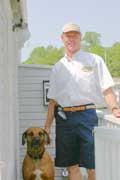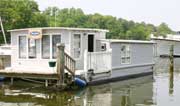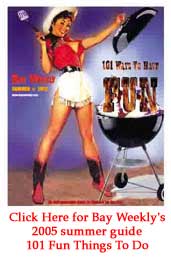|
|
 |
||
|
Volume 13, Issue 24 ~ June 16 - 22, 2005
|
|||
 ~ A Chesapeake Life ~Jonathan Foster ~ A Chesapeake Life ~Jonathan FosterMaking a living on the water means he doesn’t have to sleep in his floating office — but the dog can. story & photos by Scott Sowers The whirring sound of a bilge pump kicking on mixes in with ringing land lines, cell phones and a fax machine in the gently rocking cabin. A whiff of diesel fuel blows through the open windows as Chuey, a Rhodesian ridgeback, naps in the front of the river barge, blissfully unaware of the commerce around him. A typical workday is slowly unfolding onboard the floating office of Jonathan Foster’s yacht brokerage on the South River. On top of the hill alongside Route 2, there’s a gravel lot defined by rows of people’s hopes, dreams and desperation. Lines of land-locked Sea Rays, Regals and Chaparrals still wet from their morning bath, hold the promise of watery fun. They’re Foster’s stock and trade. There’s another river barge up on the lot, sitting on blocks pulling a tour of shore duty and functioning as a sales office. In here the deals are hashed out, deposit checks are taken and offer sheets are signed. Making a living on the water can mean a lot of things. For Jonathan Foster it means Chuey can sleep in the floating office but that Foster doesn’t have to. No Surf Foster, who at 54 remains at heart a surfer, moved east from San Diego’s totally ridable waves after marrying into the yacht-brokering Trubee family. Love pulled him away from sunny Southern California and dropped him onto the Jersey shore. Luxury power-boat impresario Dayton Trubee, Foster’s new father-in-law, offered him work at his boatyard in Point Pleasant, New Jersey. “I saw the environment, and I like to work with my hands and tinker, so I decided to give it five years,” Foster says. That was in 1983. Tinkering gradually led Foster to independence as a boat broker. But the education was a tough paddle out. “Dayton would take trades and give me the junk boats. I came up through the bilges,” Foster remembers. Learning the boat-selling ropes was hard; choosing to navigate through the straits of entrepreneurship was harder. Fresh Water In 1984, Trubee told his daughter and son-in-law that he was setting up a branch office on the South River in Annapolis. They were invited to come along for the ride. The couple spent six months living in Baltimore while the deals were cut and re-cut. While a world of possibilities beckoned, reality was less glamorous. “We were really scrambling,” Foster says. “We were living in the boatyard, and I was bartending at night.” The strains of living together on a 42-foot boat while running a business pulled the marriage apart in 1988. About the same time, Foster’s soon-to-be ex-father-in-law sold the branch office. Foster was eventually forced to move up the creek and start over. He was still struggling to make ends meet — and now he was alone. In those straits, Foster stumbled onto a lead. Boat-buyers preferred dealing with him one-to-one over deal-crazed dealerships. “I didn’t come up through the ranks of selling things, and I hoped that would bring a refreshing edge,” Foster says. “For a lot of salesmen, it’s a game and I didn’t want it to be like that.” His relaxed demeanor added a sheen of laid-back West Coast to his deals. The business grew, thanks to repeat customers and word of mouth. As the brokerage became more successful Foster became more relaxed; his pressed shirts and short-cropped hair gave way to shorts, sandals and a ponytail.  Floating Offices
Floating OfficesIn 1986 Foster gave in to another aesthetic urge with a deal including stereo equipment and a stack of blue jeans to acquire an 80-year-old motorless house barge. The barge — designed as a summer cabin complete with bathroom, kitchen and sleeping quarters — would become a floating office. When that barge took on water it was sent dockside. Foster found a seaworthy replacement in New Jersey. After $10,000 of restoration, it became the new floating office. Two barges, two offices. One for striking the deal, one for closing the deal. One on the water, the other up above, floating on a sea of gray gravel. Given the choice between working the lot on top of the hill or taking care of things from the riverfront, Foster takes the easy choice as opposed to the logical one. “It would make more business sense to be on top of the hill,” he says. The other downside to working while on the water is the possibility of getting wet. “I do worry a little about sinking, especially in the winter when snow piles up on top,” he allows. In the early 1990s, with the country in deep recession, the yacht business went into in a wicked tailspin. Luxury goods are always the first to go overboard in a weak economy, and that includes pleasure boats. Foster rode out the storm on a 1950 33-foot Owens docked amidst his inventory at Mark’s Marina on the banks of the South River. “I was living comfortably in poverty,” Foster says. In 1991 the bachelor broker attended the Annapolis Boat Show and met Janie, the woman who would become his second wife. By 1993 the recession was over, the Fosters were a couple and, with Janie’s help the business was booming — just in time to begin a new adventure tied to an old obsession, the sea. Surf’s Up Since moving to Annapolis, Foster had indulged his surfing muse by heading to Assateague every Thanksgiving. Then he heard about surfing in Costa Rica. “The first year we went for two weeks,” he says. “Then we went for three weeks, then six weeks, then three months.” As the stays lengthened, the Fosters hatched a plan to buy a piece of land and eventually build a home. Eventually, the plan was accelerated when Foster partnered up with a sailing buddy who gave him a shove into the Costa Rican real estate business. Foster returned the favor by hooking his friend into surfing. Construction on Foster and his buddy’s Costa Rican homes, which are built into a yin-yang shape with a swimming pool in the middle, began in October of 2003; the project was complete about nine months later. The feat was accomplished in an international effort coordinated mostly over the phone. “We found an American builder and hired a Swiss architect. There’s lots of expatriates there from all over Europe,” Foster says. Building costs run about one-third less than in the States, but, Foster says, finding paradise in Costa Rica “is not for everybody.” Rugged roads, wildly fluctuating airfares and the lack of nightlife are not everybody’s idea of paradise. But for Foster, the rewards win. “It’s the environment,” he says. “Pure food, the air is not polluted, the people are friendly, mellow and open. Everything is more basic and simple. It’s about un-complicating your life.” Of course there’s always the surf. “Ninety-eight percent of the time,” Foster says, “you have decent waves.” Riding the Last One In Foster’s vacation home is all about the water, and his office floats. But his days of living on a boat are over. Since 1992 he’s lived on land, in Annapolis, in a house that he shares with his family. Foster seems to have made it. But in making it, he’s paid a price amortized through years of hustling fiberglass. He’s also given up one amenity. He currently doesn’t own a boat. “My boat,” says Foster, “is a surfboard.”
|
|||
|
|
|||
|
© COPYRIGHT 2004 by New Bay Enterprises, Inc. All rights reserved. |


 About the Author:
About the Author: